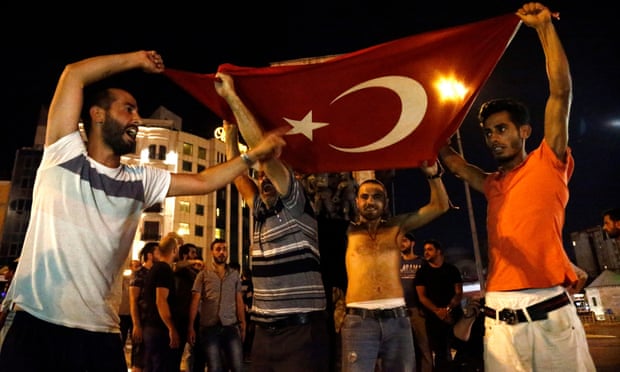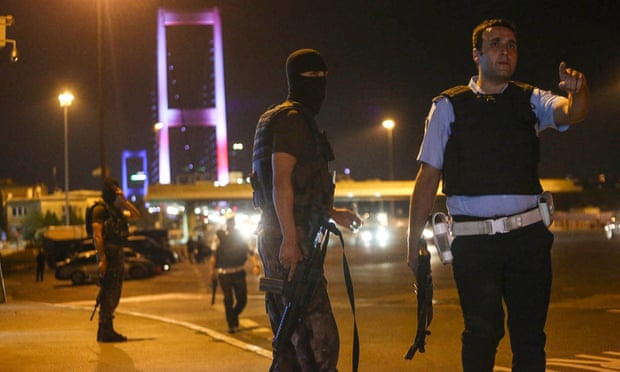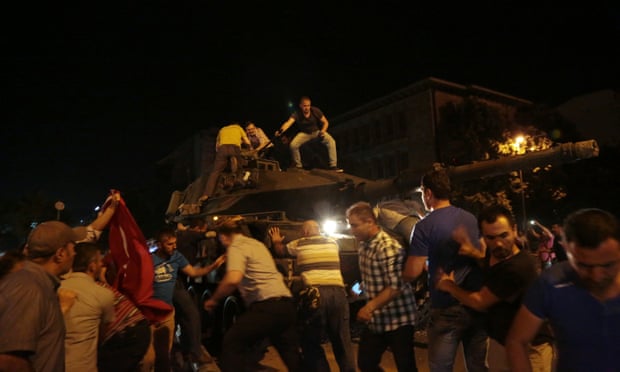Tanks open fire near Turkish parliament building
 Supporters of President Erdogan come out onto the streets of Istanbul. Photograph: Sedat Suna/EPA
Supporters of President Erdogan come out onto the streets of Istanbul. Photograph: Sedat Suna/EPA The attempted coup in Turkey threatens to dangerously destabilise a western ally in a region already reeling from war, terrorism and mass migration, according to experts and analysts in the region.
The Turkish military’s apparent attempt to seize power on Friday unleashed panic in the streets and sent shockwaves through Nato and across the Middle East.
Reports of tanks opening fire near the parliament, and fighters jets downing a helicopter filled with coup plotters, left the outcome unclear but there were early indications the power grab would fail.
Crowds filled the streets in Istanbul, Ankara and other cities in defiance of a declared martial law and curfew. With the state broadcaster TRT off the air president Recep Tayyip Erdoğan used his iPhone to broadcast an appeal to Turks to resist the coup.
The extraordinary turn of events baffled many in the foreign policy community, many of whom perceived Turkey’s elected government as relatively stable.
Professor Omer Taspinar, a senior fellow at the Brookings Institution, and one of the few foreign policy experts who has been warning of the risk of a military coup in recent months, said a critical question would be the degree to which the entire military command was involved in the attempted coup.
He said the most dangerous risk was a breakout in fighting between divisions within the Turkish military and civilian and intelligence factions aligned with Erdoğan, who was recently re-elected.
This will rattle the Turkish markets. It will tarnish the country’s image ... This will be embarrassing for Erdoğan Professor Omer Taspinar
“Right now the question is whether the attempted coup is from the top command, with the top brass involved, or a colonel or officer-coup, from a certain segment of the army. There are indications right now that it is the latter. The chief of staff of the military has not spoken yet, and traditionally with Turkish coups you would expect the head of the military to be on TV taking command.”
“This will rattle the Turkish markets. It will tarnish the country’s image. My analysis is that this will certainly be embarrassing for Erdoğan. The signs are chaotic right now, but I think the rumors of Erdoğan’s demise would be highly exaggerated given he has been on TV.”
Taspinar said it was especially embarrassing for the Turkish president because of the history of Turkish coups. “Each time the military intervened in the past it was at a time when the government was very unpopular.”
The most significant risk, Taspinar said, was a descent into bloody clashes between police forces loyal to Erdoğan’s ministry of the interior, over which he has an iron grip, and a segment of a rebellious military. “I don’t expect that to happen, but if it does it would be devastating to Turkey.”

Facebook Twitter Pinterest Turkish soldiers block Istanbul’s Bosphorus Bridge in Istanbul. Photograph: Burak Kara/Getty Images
Former prime minister Ahmet Davutoğlu told al-Jazeera a military clique had staged the coup and that it would fail.
Live Turkey coup: crackdown on failed insurgents begins – live news updates
Action taken to reinstate constitutional order, human rights and freedoms, say armed forces
Read more
Kemal Kirisci, senior fellow and director of the Turkey Project at Brookings, said the coup, along with Islamic State attacks, Britain’s vote to leave the European Union and other developments gave a sense of events spinning out of control. “The immediate damage here is to democracy.”
Stephen Flanagan, who served in the Obama administration’s National Security Council and is now an analyst for the Rand corporation, said Turkey’s military wanted tougher measures against Kurdish insurgents and to tighten its frontier with Syria.
“The military does not want to become engaged on the ground in Syria but does want to tighten up the borders to make sure that turkey is not dragged into a ground war in the region. And it wants to step up the fight against the PKK.”
Islamic State operatives in Turkey may chafe under tighter military controls in the short term but the on balance this was good news for the terror group, he said. “Continued turmoil could deepen divisions in Turkey. And distract it from doing more to help the coalition in Syria.”
The White House, a critic of Erdogan’s perceived authoritarian drift and ineffective policies, released a statement saying Barack Obama and secretary of state John Kerry “agreed that all parties in Turkey should support the democratically-elected Government of Turkey, show restraint, and avoid any violence or bloodshed”.
Turkey, which has the second-biggest army in Nato after the US, was a crucial ally during the cold war and is now an ally, albeit with significant political differences, in the fight against Isis. Last year Turkey agreed to let US warplanes and armed drones use the Incirlik airbase, just 60 miles from the north-west Syrian border. The aircraft had previously flown from Iraq or Arab allies such as Jordan.
Loss of the base would be a severe blow to the ongoing effort against Isis, especially after recent terrorist attacks within Belgium, France, Turkey and the US.
Advertisement
Eric Bordenkircher, of UCLA’s Center for Middle East Development, said the turmoil could snarl military cooperation with Ankara. “The US military will need to see whether we should continue to operate in Turkey with a non-democratic government.”
Turkey, which hosts 2.5 million refugees, mostly from Syria, has objected to US support for Kurdish forces operating in northern Syria against Isis. Washington has said it draws a clear distinction between the PKK, a foreign terrorist organisation, and the Syrian Kurds, whom it sees as one of many groups fighting Isis.
The attempted takeover marked a return to an era which had supposedly passed. In the past, army chiefs in Turkey repeatedly removed politicians with whom they disagreed or who struggled to respond to turmoil.
In 1960, army officials removed a premier and later hanged him, and three more coups took place over the next four decades, according to Reuters.

Facebook Twitter Pinterest Tanks move into position as Turkish people attempt to stop them in Ankara, Turkey. Photograph: Burhan Ozbilici/AP
The period of military domination lasted until 1965.
In 1971, following widespread unrest during a recession, the military intervened anew to “restore order”. Fahri Koruturk, a retired naval officer, became president.
The next coup happened in 1980 in what became the most brutal military coup in modern Turkish history. The military executed 50 people and about 600,000 were arrested. Hundreds disappeared.
In 1997, during Turkey’s first Islamist-led government, prime minister Necmettin Erbakan was toppled in a so-called “post-modern coup”.
Taspinar, the Brookings analyst, said Friday’s chaos was especially embarrassing for Erdoğan because the previous coups all occurred when government appeared unstable and unpopular.

אין תגובות:
הוסף רשומת תגובה